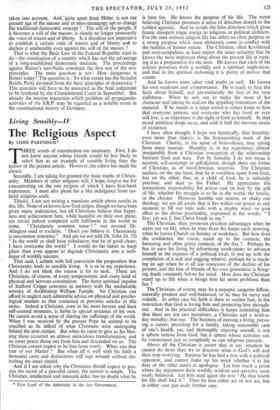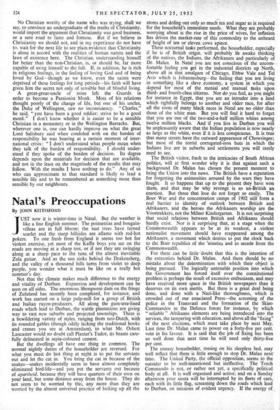Living Sensibly—I V
The Religious Aspect
By LORD PAKENHAM*
THREE words of introduction are necessary. First, I do not know anyone whose friends would be less likely to select him as an example of sensible living than the author of the present article. However, the editor has made his choice.
Secondly, I am taking for granted the basic truths of Christi- anity. Members of other religions will, I hope, forgive me for concentrating on the one religion of which I have first-hand experience. I must also plead for a like, indulgence from iso- lated religious souls.
Thirdly, I am not writing a mundane article about results in this lite. None of us knows how God judges, though we have been given many indications, but all Christians believe that happi- ness and achievement here, while laudable on their own plane, are trivial indeed compared with fulfilment in the world to come. " Christianity common sense ! " our revered Dr. Alington used to exclaim. " Don't you believe it. Christianity is uncommon nonsense." And are we not-told (St. John 16. 33) " In the world ye shall have tribulation; but be of good cheer; I have overcome the world." I would do far better to keep pent than even appear to degrade Christianity into a tech- nique of worldly success.
That said, I submit with full conviction the proposition that Christianity leads to sensible living. It is so in my experience. And I do not think the reason is far to seek. There are Christians, of course, of every temperament, and every kind of physical and nervous constitution. The fierce spiritual impulse of Stafford Cripps contrasts in memory with the unshakable serenity of Archbishop William Temple. No Christian can afford to neglect such admirable advice on physical and psycho- logical matters as that contained in previous articles in this series. Indeed a Christian, even in his most fervent and least self-centred moments, is liable to special anxieties of his own. He cannot avoid a sense of sharing the sufferings of the world. When I was received by the present Pope he seemed to be crucified as he talked of what Christians were undergoing behind the iron curtain. But when he came to give us his bles- sing there occurred an almost miraculous transformation, and an inner peace shone out from him and descended on us. The Christian cannot expect to be free from worry. When was that true of our Master ? But when all is well with his faith a thousand cares and distractions will rage around without dis- turbing the inner citadel.
And if I am asked why the Christians should expect to pos- sess the secret of a peaceful centre, the answer is simple. The Christian, intellectual and innocent alike, has no doubt what he * First Lord of the Admiralty in the last Government. is here for. He knows the purpose of his life. The worst believing Christian possesses a sense of direction denied to the noblest agnostic. And he avoids the false direction which gives frantic misspent tragic energy to religious or political idolaters. For the man without religion life has either no clear purpose or a wrong purpose which must ultimately come in conflict with the realities of human nature. The Christian, often bewildered and over-scrupulous, at least enjoys the inner certainty that he knows the most important thing about the present life in treat- ing it as a preparation for the next. He knows that each of his actions possesses both a worldly and a spiritual implication, and that in the spiritual reckoning it is purity of motive that counts.
And he knows some other vital truths as well. He knows his own weakness and unimportance. He is ready to face the facts about himself, and pre-eminently the fact of his own sinfulness. When he sets out to make the most of his character and talents he realises the appalling limitations of the material. If he stands in a large crowd it comes home to him that everyone present, and everyone who has lived or ever will live, is as important in the sight of God as himself. In that mood ambition drops away, and with it half the nervous strain of existence.
I have often thought, I hope not heretically, that humility, even more than charity, is the distinguishing mark of the Christian. Charity, in the sense of benevolence, may spring from many sources. Humility is, in my experience, almost inseparable from a Christian conception of the relationship between God and man. For by humility I do not mean a neurotic self-contempt or self-distrust, though there are forms of Christian, as of non-Christian, neurosis. The Christian realises, on the one hand, that he is worthless apart from God, but on the other, that, as a child of God, he is infinitely precious, and dear to his Father. He appreciates the tremendous responsibility for action cast on him by the gift of life, whether his struggle is to lie in the world, the family, or the cloister. However humble our station, or shaky our theology, we are all aware that it lies within our power at any moment to fill our little sails with a mighty wind—to give effect to the divine potentiality, expressed in the words: " I live; yet not I, but Christ liveth in me."
The Christian, then, possesses priceless advantages when he starts out on life, when he rises from his knees each morning, when he leaves Church on Sunday or weekdays. But how does the confidence, the vision, stand up to the contacts, the harassing and often grimy contacts, of the day ? Perhaps he has to earn his living by advertising tooth-paste; to advance himself at the expense of a political rival; to put up with the complaints of a sick and nagging relative; perhaps he is reach- ing an age when he is all too conscious of the decline of his powers, and the loss of friends of his own generation is bring- ing death constantly before his mind. How does the Christian stand up to life when it brings him far more problems than fun ?
The Christian, of course, may- be a eupeptic sanguine fellow, naturally prudent and well-balanced, or he may be nervy and volatile. In either case his faith is there to sustain him, in the conviction that God is loving him and protecting him through- out. And in his practical difficulties it keeps reminding him that there are not two moralities, a Christian and a work-a- day morality, but one. The business of earning a living, pursu- ing a career, providing for a family, taking reasonable care of one's health; yes, and thoroughly enjoying oneself, is not a sphere remote from God, but a sphere whose activities can be consecrated just as completely as can religious pursuits. Above all the Christian is aware that in any situation he cannot do more than try to discover what is God's will and then stop worrying. Suppose he has had a row with a political opponent, and cannot make up his mind whether it is his duty or the other man's to apologise. Let him reach a point where the arguments from worldly wisdom and quixotry seem nicely balanced. Let him read again the text " He that loseth his life shall find it." Then let him either act or not act, but in either case put aside further care. No Christian worthy of the name who was trying, shall we say, to convince an undergraduate of the truths of Christianity, would import the argument that Christianity was good business, or a sure road to fame and fortune. But if we believe in Christianity we should not, and in my experience do not have to, wait for the next life to see plain;evidence that Christianity is alone in accord with the realities of human nature and the laws of existence here. The Christian, understanding himself far better than the non-Christian, is, or should be, far more capable of using himself to the full. If, in addition, he is rich in religious feelings, in the feeling of loving God and of being loved by God—though as we know, even the saints were deprived of these feelings for long periods—his faith will have given him the secret not only of sensible but of blissful living.
A great-great-uncle of mine left the Guards in order to become a Passionist Monk. Most of his relations thought poorly of the change of life, but one of his uncles, the Duke of Wellington, saw no inconsistency. " Charles," he said, " you have been a good soldier; strive to be a good monk." I don't know whether it is easier to be a sensible Christian in a monastery or in the Wellington Barracks. But, wherever one is, one can hardly improve on what the great Lord Salisbury said when condoled with on the burden of responsibility he was bearing at a certain moment of inter- national crisis: " I don't understand what people mean when they talk of the burden of responsibility. I should under- stand if they spoke of the burden of decision. Its degree depends upon the materials for decision that are available, and not in the least on the magnitude of the results that may follow. With the results I have nothing to do." Any of us who can approximate to that standard is likely to lead a sensible life and to be remembered as something more than sensible by our neighbours.



































 Previous page
Previous page